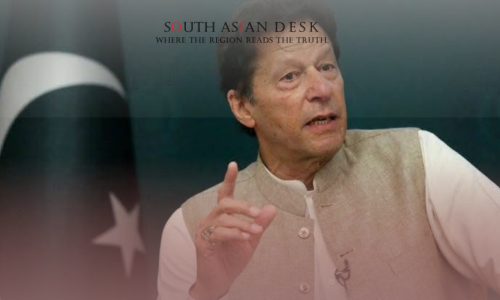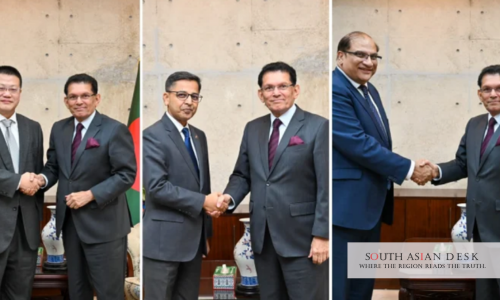Imran Khan, the founder of Pakistan Tehreek-e-Insaf (PTI), has sought five names from his party to nominate a new opposition leader in the Punjab Assembly, following the recent conviction of the incumbent.
This move comes as the Punjab Assembly grapples with leadership vacancies and escalating tensions, evoking concerns over the stability of democratic processes in the region. Khan’s directive underscores the challenges facing PTI, as it navigates legal hurdles and strives to maintain its influence in key legislative bodies.
Imran Khan’s Strategic Nominations Across Assemblies
Imran Khan has made decisive nominations for opposition leadership roles in both the National Assembly and the Senate, signalling a concerted effort to consolidate PTI’s position amid ongoing political pressures. Mahmood Khan Achakzai has been selected as the opposition leader in the National Assembly, a choice that reflects Khan’s intent to forge alliances and strengthen opposition voices.
In the Senate, Azam Khan Swati has been nominated for the opposition leader position, a role that could amplify PTI’s critique of government policies. These announcements were conveyed by PTI Information Secretary Raoof Hasan and Punjab chapter Information Secretary Salman Akram Raja during a press conference, highlighting the party’s resolve to address vacancies promptly.
The nominations follow recent actions by the Election Commission of Pakistan, which have reshaped the political landscape. Khan’s choices aim to ensure robust representation for PTI, fostering hope among party loyalists who yearn for effective advocacy in parliamentary forums.
Background on National Assembly and Senate Developments
The selection of Achakzai and Swati is particularly poignant, as it occurs against a backdrop of legal and electoral disputes that have plagued PTI since the events of May 9. Supporters view these nominations as a step towards reclaiming narrative control, evoking a sense of resilience in the face of adversity. Political analysts suggest that these leaders could play pivotal roles in challenging legislation and holding the government accountable, thereby safeguarding the interests of ordinary citizens who feel marginalised.
Crisis in Punjab Assembly Leadership
The focal point of recent developments is the Punjab Assembly, where the opposition leader position has become vacant due to the sentencing of Malik Ahmad Khan Bhachar. An anti-terrorism court in Sargodha convicted Bhachar, along with Member of the National Assembly Ahmad Chattha and over 30 PTI workers, to 10 years in prison over charges related to the May 9 riots. This verdict has sparked widespread dismay, with many perceiving it as a blow to political freedoms.
Imran Khan’s request for five names to choose from for the Punjab Assembly opposition leader role is seen as a pragmatic response to this setback. Party insiders indicate that the process will involve careful deliberation to select a candidate capable of uniting the opposition and effectively countering the ruling coalition’s agenda. The Punjab Assembly, with its significant PTI representation, remains a crucial battleground for the party, where decisions could impact millions of residents seeking better governance and accountability.
Impact of Convictions on PTI Workers
The convictions have not only affected high-profile figures like Bhachar but have also led to broader repercussions for PTI activists. Reports from various sources detail protests erupting across Punjab, with demonstrators expressing frustration over what they describe as unjust detentions. In Lahore, more than 300 PTI workers, including Punjab Assembly Deputy Opposition Leader Moeen Raza Qureshi and party leader Rehana Dar, were reportedly arrested during rallies marking two years since Khan’s imprisonment. These events evoke deep empathy for those enduring hardships, as families and communities rally in support, hoping for justice and the release of political prisoners.
Protests outside the Punjab Assembly have highlighted demands for fair treatment, with participants chanting slogans against perceived injustices. Such gatherings underscore the emotional toll on supporters, who feel their voices are being suppressed in a democratic setup meant to protect them.
Broader Implications for Pakistan Politics
These developments in the Punjab Assembly and beyond carry significant implications for Pakistan’s politics, particularly for PTI’s future trajectory. With Imran Khan still incarcerated, his directives from behind bars demonstrate unwavering leadership, inspiring loyalty among members who stand firm despite challenges. The party’s emphasis on setting up parallel assemblies or holding press conferences reflects a strategy to maintain visibility and pressure the establishment.
Observers note that the nominations could foster healthier competition in legislative debates, potentially leading to reforms that address public grievances. However, the ongoing legal battles, including those tied to the May 9 incidents, continue to cast a shadow, raising questions about the judiciary’s role in political affairs.
As PTI prepares to finalise its Punjab Assembly opposition leader nominee from the five suggested names, the nation watches closely. This moment encapsulates the struggles and aspirations of a populace yearning for transparent leadership and equitable representation. In the Punjab Assembly, where decisions shape daily lives, Imran Khan’s call for new nominees offers a glimmer of hope amid uncertainty, reinforcing the party’s commitment to democratic ideals in Pakistan politics.
Published in SouthAsianDesk, August 21st, 2025
Follow SouthAsianDesk on X, Instagram and Facebook for insights on business and current affairs from across South Asia.






